Graph the inverse
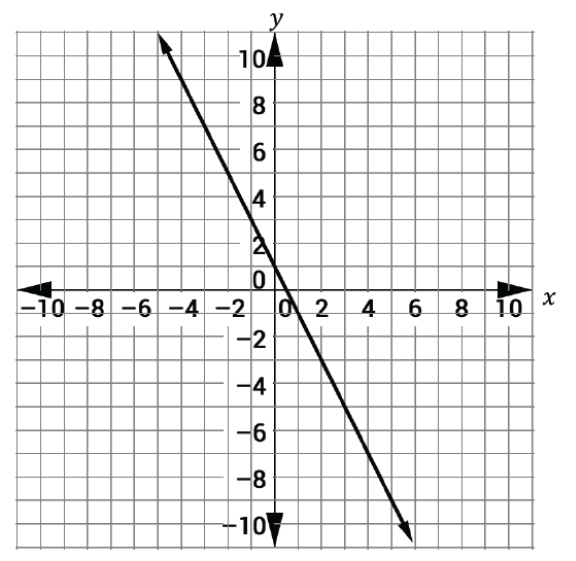
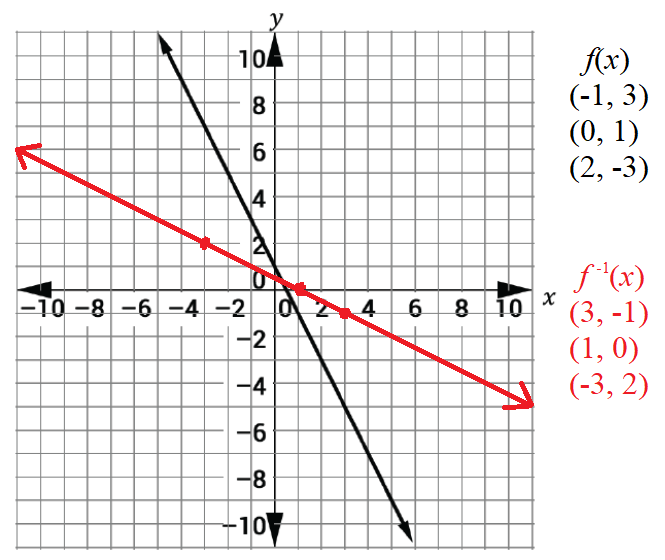
What is the negative interval
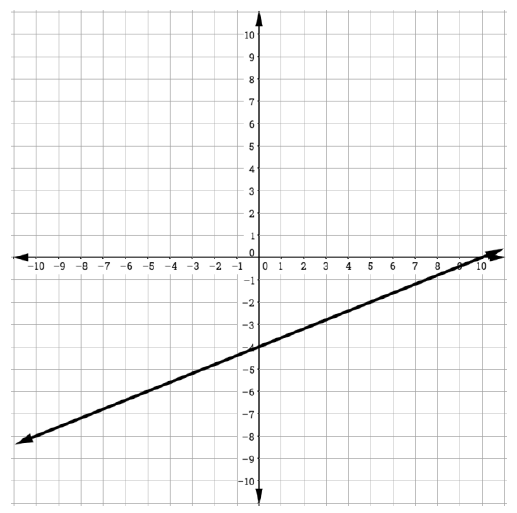
(-∞,10)
What is the negative interval

(1, ∞)
Solve the system
x + 3y = 5
2x − 3y = −8
ELIMINATION. Add the two equations
3x = -3
x = -1
Plug in x to find y
-1 + 3y = 5
3y = 6
y = 2
(−1, 2)
How can you tell if a linear system has infinitely many solutions or no solution?
INFINATELY MANY: The equations are the same, the graphed lines lie on top of one another, or solving the system provides a true statement with no variables.
NO SOLUTION: The lines are parallel or they have the same slope and different y-intercepts or when you solve the equations and get a false statement with no variables remaining.
Determine if
3y=-6x
is even, odd or neither
y=-2x+0
Linear function goes through origin. Origin symmetry. Odd.
Given the linear function
f(x)=-x+5
find the x and y intercepts
x-int, set y=0 solve for x
0=-x+5
-5=-x
x=5
y-int, set x=0 solve for y
y=-0+5
y=5
Given the linear function
f(x)=3x+7
find the end behavior
right side up
x -> ∞, f(x) -> ∞
left side down
x -> -∞, f(x) -> -∞
Solve the system
3y − 5x = −26
−2y − 5x = −16
ELIMINATION. Multiply top equation by -1 to change signs
3y − 5x = −26
2y + 5x = 16
add the two equations together
5y = -10
y = -2
Plug in y to find x
3(-2) − 5x = −26
-6 - 5x = -26
-5x = -20
x = 4
(4, −2)
Solve the system
y = 2x + 2
y = x − 1
GRAPHING. Graph the two lines
(-3, -4)
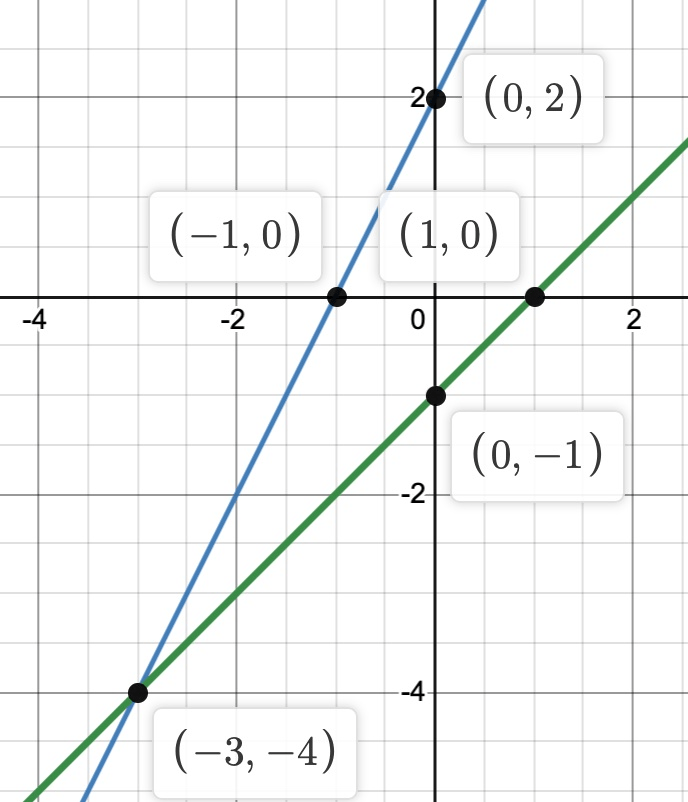
Determine if
3y -6x = -6x + 12
is even, odd or neither
3y=12
y=4
Linear function, horizontal line. y-axis symmetry. Even.
Given the linear function
f(x)=-7x+2
find the end behavior
right side down
x -> ∞, f(x) -> -∞
left side up
x -> -∞, f(x) -> ∞
Given the linear function
3x-2y=8
find the x and y intercepts
x-int, set y=0 solve for x
3x-2(0)=8
3x+0=8
3x=8
x=8/3
x=5
y-int, set x=0 solve for y
3(0)-2y=8
0-2y=8
-2y=8
y=-4
Solve the system
y = 1/2 x + 2
y = 1/4 x + 4
GRAPHING. Graph the two lines.
(8, 6)
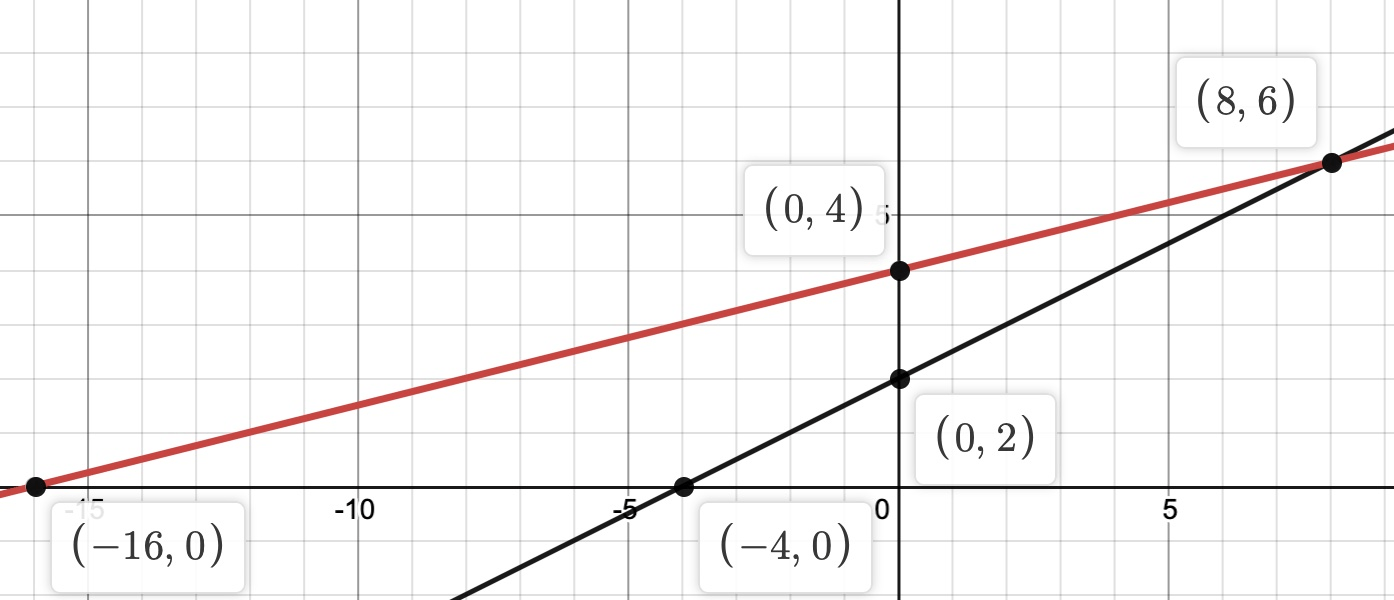
Solve the system
−5y + 8x = −18
5y + 2x = 58
ELIMINATION. add the two equations together
10x = 40
x = 4
Plug in x to find y
−5y + 8(4) = −18
-5y + 32 = -18
-5y = -50
y = 10
Plug in y to find x
−5(10) + 8x = −18
-50 + 8x = -18
8x = 32
x = 4
(4, 10)
Given
f(x)=x/3 +8
Find
f^-1(x)
Switch x and y and solve for y
x=y/3 +8
x - 8 = y/3
3(x-8) = y
f^-1(x)=3x-24
Given the linear function
f(x)= 3/4x-2
find the increasing, decreasing and constant intervals
Increasing:
(-∞, ∞)
Decreasing: None
Constant: None
Given the linear function
f(x)=1/5x+2
find the positive and negative intervals
Positive Interval:
(-10, ∞)
Negative Interval:
(-∞, -10)
Solve the system
5x − 13 = y
−5x + y = 24
SUBSTITUTION. Plug in y which is (5x − 13) into y on second equation
−5x + 5x − 13 = 24
-13 != 24
no solution
Solve the system
x = −3y + 2
−x + 2y = 3
SUBSTITUTION. Plug in x which is (−3y + 2) into x on the bottom equation
−(−3y + 2) + 2y = 3
3y - 2 + 2y = 3
- 2 + 5y = 3
5y = 5
y = 1
Plug in y to find x
x = −3(1) + 2
x = −3 + 2
x = -1
(−1, 1)
Given the graph of
f(x)
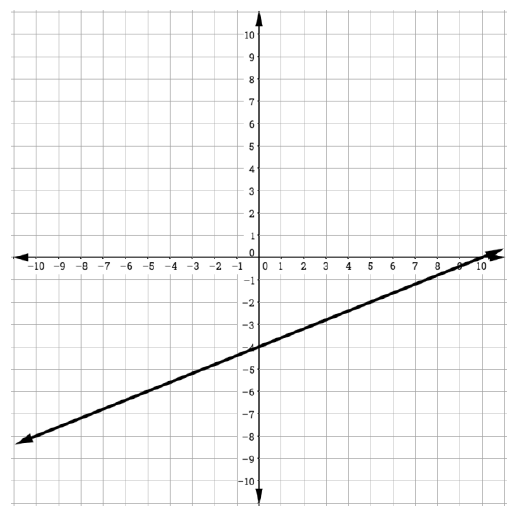
Find
f^-1(-2)
Inverse graph when x = -2, y = 5
f^-1(-2)=5
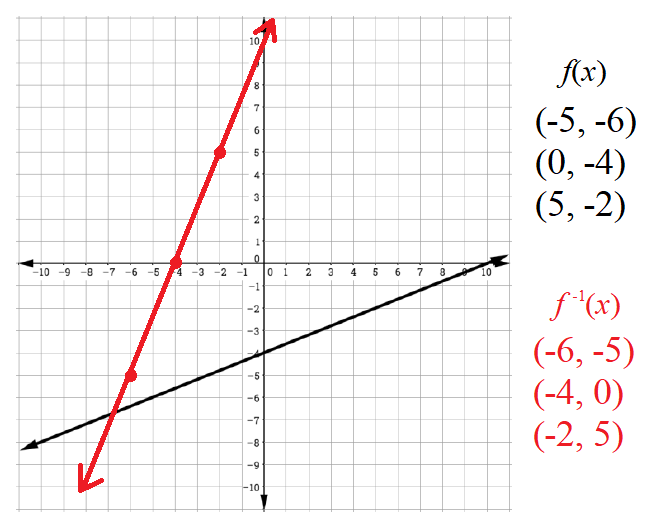
f(x)=-2x-4
Given the linear function
find the positive and negative intervals
Positive Interval:
(-∞, -2)
Negative Interval:
(-2, ∞)
Given the linear function
f(x)= -1/5x+9
find the increasing, decreasing and constant intervals
Increasing: None
Decreasing:
(-∞, ∞)
Constant: None
Solve the system
4x−9y = 2
12x−5y = −38
ELIMINATION. Multiply top equation by -3
-12x+27y = -6
12x−5y = −38
add two equations together
22y = -44
y = -2
Plug in y to find x
4x−9(-2) = 2
4x + 18 = 2
4x = -16
x = -4
(-4, -2)
Solve the system
3x − 4y = 8
18x − 5y = 10
ELIMINATION. Multiply top equation by -6
-18x + 24y = -48
18x − 5y = 10
add two equations
19y = -38
y = -2
Plug in y to find x
3x − 4(-2) = 8
3x + 8 = 8
3x = 0
x = 0
(0, -2)